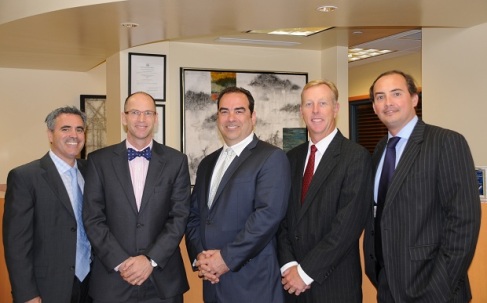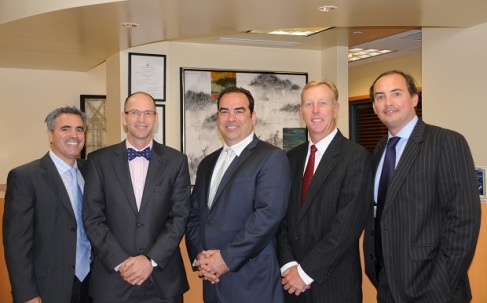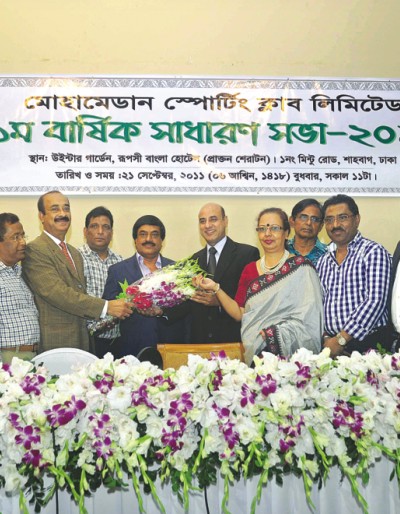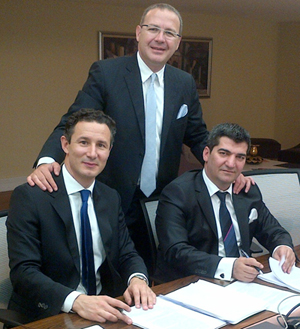Obaidul Karim is a distinguished self-achieved Industrialist & Businessman. He is the founder Chairman of ORION GROUP, one of the leading industrial conglomerates in Bangladesh. Bangladesh is an economy firmly in transition. Driven by the ramifications of the success over the years, ORION GROUP, through major investment undertakings, has meaningfully contributed to the country’s national economy’s stability in financial market. Underlying all of the Group’s activities are the common threads of change, flexibility, and fostering closer ties with the Government and its clients.
Starting from early eighty’s with a vision of taking our nation a step towards tomorrow.
Obaidul Karim has been one of leading Entrepreneurs in the country over the years. The road had been quite difficult and the tasks forbidding, but Mr. Karim made it possible only by his commitment, dedication and self-confidence. With the support of a highly skilled management structure under the leadership of Mr. Karim and support of almost 18000 dedicated professionals, ORION has achieved a degree of success that is unparalleled in the country’s business history. ORION has assumed the leadership role with its operations in the pharmaceuticals, cosmetics & toiletries, infrastructure development, Real Estate & construction, power, high-tech agro products, textiles & garments, aviation management and trading sectors. Some of the units of the Group are successfully listed in the Stock Exchange of Bangladesh .
ORION’s major foreign partners and collaborators include, LEA International of Canada, LEA Associates South Asia of India, Cord Engineering of Singapore, 3-B Plan of Turkey, New Vision of the UAE, Belbaco Contracting LLC of UAE, Benifts Group of Sudan, Panbo Systems BV of the Netherlands, Haarhuis Generatoren of the Netherlands, Changjhow Wajin of China.
Monthly Archives: August 2012
Obaidul Karim
Obaidul Karim is a distinguished self-achieved Industrialist & Businessman. He is the founder Chairman of ORION GROUP, one of the leading industrial conglomerates in Bangladesh. Bangladesh is an economy firmly in transition. Driven by the ramifications of the success over the years, ORION GROUP, through major investment undertakings, has meaningfully contributed to the country’s national economy’s stability in financial market. Underlying all of the Group’s activities are the common threads of change, flexibility, and fostering closer ties with the Government and its clients.
Starting from early eighty’s with a vision of taking our nation a step towards tomorrow.
Obaidul Karim has been one of leading Entrepreneurs in the country over the years. The road had been quite difficult and the tasks forbidding, but Mr. Karim made it possible only by his commitment, dedication and self-confidence. With the support of a highly skilled management structure under the leadership of Mr. Karim and support of almost 18000 dedicated professionals, ORION has achieved a degree of success that is unparalleled in the country’s business history. ORION has assumed the leadership role with its operations in the pharmaceuticals, cosmetics & toiletries, infrastructure development, Real Estate & construction, power, high-tech agro products, textiles & garments, aviation management and trading sectors. Some of the units of the Group are successfully listed in the Stock Exchange of Bangladesh .
ORION’s major foreign partners and collaborators include, LEA International of Canada, LEA Associates South Asia of India, Cord Engineering of Singapore, 3-B Plan of Turkey, New Vision of the UAE, Belbaco Contracting LLC of UAE, Benifts Group of Sudan, Panbo Systems BV of the Netherlands, Haarhuis Generatoren of the Netherlands, Changjhow Wajin of China.
Obaidul Karim
Obaidul Karim
ORION GROUP is one of the leading industrial conglomerates in Bangladesh over the years. With the support of a highly skilled management structure and 18000 dedicated professionals, ORION has achieved a degree of success that is unparalleled in the country’s business history.
ORION has assumed the leadership role with its operations in the Pharmaceuticals, Cosmetics & Toiletries, Infrastructure Development, Real Estate & Construction, Power, High-tech Agro Products, Hospitality, Textiles & Garments, Aviation Management sectors. Some of the units are successfully listed in the Stock Exchange.
ORION is the market leader in Pharmaceuticals and Cosmetics & Toiletries sectors over the years in the country. Besides these, ORION has extensively focused on Infrastructure Development and Power Generation businesses through major investment undertakings and significantly contributed to the country’s national economy’s stability through the right business to business strategy.
The Group’s main objective follows the principle to reduce rural poverty and foster sustainable economic development of the country.
Obaidul Karim says,
Vision, Mission & Values
Vision:
‘To be regarded as a world-class corporate house through products, services & values’.
Mission:
• Continuous development of people competency.
• Recognizing individual contribution.
• Introducing new and innovative products and technologies.
• Assuring quality products from advanced manufacturing facilities.
• Exceeding customer satisfaction and granting trust through quality services.
Values:
To achieve its aspired vision, Orion subscribes the following values:
• Quality in everything we do.
• Live up to our commitments.
• Transparent and fair in all our dealings.
• Take initiative to exceed standards.
• Trust and respect to each other.
• Work as a team.
• Share social responsibility.
Strategic Business Units:
• Agro Products
• Aviation Management
• Cosmetic & Toiletries
• Construction & Allied
• Energy Sector
• Hospitality Management
• Infrastructure Development
• Knit Textiles
• Pharmaceuticals
• Power Generation
• Real Estate
Obaidul Karim – Latest News
2nd Test: SA 262 for 5 at stumps on Day 1 against England SCORECARD
Alviro Petersen hit his fourth Test century at Headingley on Thursday to steer South Africa to 262 for 5 at stumps on day one of the second Test against England.
Petersen’s unbeaten 124 came from 266 balls with 16 fours, while Graeme Smith hit 52, from 93 balls with four fours.
Stuart Broad, who took 55 for 1, bowled AB de Villiers and Steven Finn (78 for 1) bowled Dale Steyn shortly before stumps to keep England in contention.
James Anderson, with 42 for 1 and Tim Bresnan with 68 for 1, also took wickets.
A major talking point came in the 12th over of the day when Smith edged to Andrew Strauss at first slip, only for the ball to be ruled dead because paceman Steve Finn had dislodged the bails on his follow through.
England captain Strauss had an animated discussion with umpire Steve Davis, but law 23.4, section 6 of cricket’s rules says: “An umpire shall call and signal dead ball when the striker is distracted by any noise or movement while receiving.”
Smith was on 6 when he was reprieved by the dead ball decision. Finn, who has collided with the stumps throughout his career, had previously knocked the bails off twice during the morning session.
Finn’s inclusion in England’s team was unexpected. In a major surprise, England left out Graeme Swann, making it the first Test the hosts have played without a specialist spin bowler since 2003 — also against South Africa at Headingley.
Although there was only partial cloud cover, England chose to bowl after winning the toss, a gamble that initially appeared to backfire.
After 45 fruitless minutes, Anderson finally drew an edge when Petersen was on 29. But Alastair Cook, who was fielding in Swann’s usual position of second slip, dropped an easy chance.
Obaidul Karim -Orion Group
Obaidul Karim, owner of Orion Groups bangladesh have spoke about technology on the occassion of TECHNO EXPO.
Obaidul Karim’s Speech about technology relates to the technologies designed to duplicate and respond to the human voice. They have many uses. These include aid to the voice-disabled, the hearing-disabled, and the blind, along with communication with computers without a keyboard. They enhance game software and aid in marketing goods or services by telephone.
Speech synthesis is the artificial production of human speech. A computer system used for this purpose is called a speech synthesizer, and can be implemented in software or hardware. A text-to-speech (TTS) system converts normal language text into speech; other systems render symbolic linguistic representations like phonetic transcriptions into speech.]
Synthesized speech can be created by concatenating pieces of recorded speech that are stored in a database. Systems differ in the size of the stored speech units; a system that stores phones or diphones provides the largest output range, but may lack clarity. For specific usage domains, the storage of entire words or sentences allows for high-quality output. Alternatively, a synthesizer can incorporate a model of the vocal tract and other human voice characteristics to create a completely “synthetic” voice output.
The quality of a speech synthesizer is judged by its similarity to the human voice and by its ability to be understood. An intelligible text-to-speech program allows people with visual impairments or reading disabilities to listen to written works on a home computer. Many computer operating systems have included speech synthesizers since the early 1990s.
n Computer Science, speech recognition is the translation of spoken words into text. It is also known as “automatic speech recognition”, “ASR”, “computer speech recognition”, “speech to text”, or just “STT”.
Speech recognition (SR) is technology that can translate spoken words into text. Some SR systems use “training” where an individual speaker reads sections of text into the SR system. These systems analyze the person’s specific voice and use it to fine tune the recognition of that person’s speech, resulting in more accurate transcription. Systems that do not use training are called “Speaker Independent” systems. Systems that use training are called “Speaker Dependent” systems.
Speech recognition applications include voice user interfaces such as voice dialing (e.g., “Call home”), call routing (e.g., “I would like to make a collect call”), domotic appliance control, search (e.g., find a podcast where particular words were spoken), simple data entry (e.g., entering a credit card number), preparation of structured documents (e.g., a radiology report), speech-to-text processing (e.g., word processors or emails), and aircraft.
The term voice recognition refers to finding the identity of “who” is speaking, rather than what they are saying. Recognizing the speaker can simplify the task of translating speech in systems that have been trained on specific person’s voices or it can be used to authenticate or verify the identity of a speaker as part of a security process.




